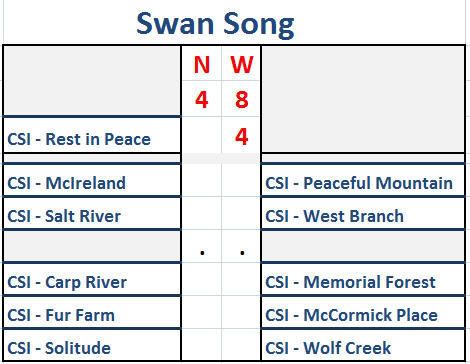The coordinates
above are false.
This is the final of a 12 cache
CSI series. Prizes may be won for finding the whole
series.
Read my Profile for more
information.
You will need to write down the LETTER found on
the inside lid of the 11 ammo cans from the CSI series to find this
cache.
CSI - Carp River
CSI - Fur Farm
CSI - McCormick Place
CSI - McIreland
CSI - Memorial Forest
CSI - Peaceful Mountain
CSI - Rest In Peace
CSI - Salt River
CSI - Solitude
CSI - West Branch, Sturgeon River
CSI - Wolf Creek
Upon finishing all 11 caches, figure out this
cache using the chart provided below.
The
expression swan song is a half-century older than the ballet
Swan Lake, and the sentiment behind it is several millennia
older
than that.
One of the most pervasive of swan-legends is that a swan sings a
beautiful song just before dying. Though it is a superstition
with no
basis in fact, it was believed by Plato, Euripedes, Aristotle,
Senaca, and Cicero. (Pliny, among others, disbelieved it, and
the
truth of
the superstition was debated at various times.) References to the
legend are found in the works of many English writers,
including
Chaucer, who mentions it twice, Caxton, Shakespeare (twice), and
Spenser. Coleridge, ever the wit, commented notably that
Swans sing
before they die; 'twere no bad thing/ Did certain persons die
before they sing.
Despite the
age and pervasiveness of the legend, the phrase swan song
itself doesn't appear in English until 1831, when Carlyle
mentions it
literally in his Sartor Resartus; he used it figuratively to
mean 'the final work of a person's life' several years later.
Carlyle was
apparently translating the earlier German word
schwanengesang or schwanenlied, the existence of
which demonstrates
the
pervasiveness of the legend.
Use a highlighter
or other method to cross reference which letter you found in each
cache listed on this chart
WARNING: Don't mistake the white "I" with a red
background as a red "O" Many cachers have!

Now fill in this
chart with the correct Number to come up with a cache
coordinates.

